
We need to expand our team of proofreaders as we aim to increase the rate of republication of Satsvarūpa Mahārāja’s books as well as new books that he writes.
This includes a need for fluent bilingual Spanish and English speakers to proofread Spanish translations (we currently have around 20 Spanish translations waiting to be proofread).
Anyone interested in this particular service should contact Manohara dāsa at [email protected]
If you would like to help, please contact Kṛṣṇa-bhajana dāsa at [email protected] or [email protected] and we will find you a service that utilizes your talents.
I am going to try to do better. This drowsy stuff is something you can control. It’s not so subtle. You have got to stand up and walk and chant loudly and keep track of time with your stopwatch. Say, “Hey, no more of this.” Don’t sit on that bed if it’s no good. Go for improvement on the lowest level and work up.
******
You have to deal with fatigue—and inattention. Pay attention just to the simple operations, the willing return of the mind to hearing. Don’t get into a big reaction against pramada, as if you are astonished at inattention. It’s normal.
******
“Maintain a fighting spirit. The mind always wanders. The senses always tend to drowse in the early morning hours. Therefore, good japa is a matter of successfully combating these things. Like the example of steering a car: keeping control means keeping from going out of control—it is natural that the car heads off the road.” (Japa Reform Notebook, p. 4).
******
I have always been production-oriented; now employ that drive in the service of Krsna. Produce humble japa. Produce maha-mantras by the tens of thousands, by the lakhs and crores. At least a few will be good.
******
Early morning improvements: sitting in the standard japa asana; chanting quicker rounds (under 7 minutes 40 seconds, which is fast for me, and the sixth round was 7.00); bringing the mind back patiently without frustration, from wherever it wanders; simple faith like we used to have, to hear the mantra, think of it like a sign on which the Hare Krsna mantra is printed and all we have to do is pay attention to the words as they pass across our consciousness. Just pay attention and the maha-mantra will do its own work.
******
“Good” japa = not sleepy, but paying attention to what you are doing. On a scale from zero to ten, I rate this as five. This is what many devotees in ISKCON count as good rounds. I have been below this, especially in my post-breakfast japa and also around 6 A.M. when I get sleepy. So be humble enough to keep working at bringing your japa up to the fifty percent mark.
******
Thinking more about myself as “a nice guy” and how this can work against more intense endeavors. I remember my mother was telling me at the dinner table (I was at least twenty years old) that I would succeed in life in my own way because I was so “easygoing.” Easygoing was a compliment I gratefully accepted. I think of it as perhaps inherited from the Italian side of the family. It is a stereotype, but it meant no angst or Kierkegaardian spiritual dilemmas. But an easygoing guy might be complacent with himself and say, “Look, I’m not perfect. I chant my rounds every day. What’s the big deal about reforming? Let’s go take prasadam.”
******
It is not by my own endeavor that I can achieve krsna-prema in chanting. I know that. But gee whiz, we can’t be a molly-coddle either. Got a lot of work to do to get a mantra through and get back out of this material world, by Krsna’s grace, to the spiritual world.
******
“O maha-mantra, You ocean of virtues! From the shore in dark night we hear You splashing and sense Your vastness. Your infinite nature is out there. You are dangerous and yet comforting….” I’m feeling okay, peppy, awake and all that. Don’t knock it. The old man has life. He wants to chant.
pp. 71-74
Don’t be anxious about your maintenance. Krsna will provide. He takes care of His servants. This attitude can be taken up to different degrees. One may go on working hard and continue to be anxious about money-making and paying bills, yet have a certain satisfaction that the final outcome is up to Krsna. Thus to some extent the worldly anxiety is reduced. After all, we’re not the doers. Bhaktivinoda Thakura’s proposal seems more radical, that he will no longer make money or provide for his relatives, but instead he will engage full-time in chanting Hare Krsna. Remember Mrgari, the hunter who was saved by Narada? He was also worried about how he would survive when Narada told him to break his bow. But Narada assured him that he would arrange for his meals. So Mrgari spent his full time chanting in his little hut. Bhaktivinoda Thakura sings, “I will serve You free from all anxiety, and at home, if any good or evil should occur, it will not be my responsibility” (Saranagati, 3.2.7).
The pure devotee is ready to do whatever the Lord wants and is not afraid of the outcome. He may continue earning money, or he may stop. Often he continues earning money just to set an example for others. “So as not to disrupt the minds of ignorant men attached to the fruitive results of prescribed duties, a learned person should not induce them to stop work. Rather, by working in the spirit of devotion, he should engage them in all sorts of activities (for the gradual development of Krsna consciousness)” (Bg. 3.26).
We desire to be full-time servants of Krsna. We want no other occupation. Many of us have been full-time devotees for most of our adult lives. Externally, this means we haven’t had jobs, we have served in ISKCON. But ISKCON has its own anxieties about raising money and it has evolving attitudes as to what is the best way to go about it.
What is my duty as a sannyasi? I don’t need a job, that’s clear. I should live as a biksu tridandi and accept alms. I should live according to what comes. I drive around in our Renault Master van and then fly to India once a year. Krsna is providing. I try not to misuse this facility, because abusing it would be an anartha in bhakti. But at least I should be grateful enough to acknowledge that Krsna is maintaining me.
We always wonder if we are doing the best thing. We want to be able to have a deep conviction in the direction our lives are taking. Krsna is maintaining us, and up to a point, we also have to help ourselves. We trust Krsna and we have to learn to trust our own intentions in Krsna consciousness. The Madhurya Kadambini lists a symptom of unsteadiness as “indecision.” You go back and forth, back and forth, trying to decide what course to take even in spiritual life. It’s better just to plunge in and trust that Krsna will take care of the results.
Bhaktivinoda Thakura describes himself as a dog in the Lord’s household. “Chain me nearby and maintain me as You will. I shall remain at the doorstep, and allow no enemies to enter Your house” (Saranagati, 3.3.2). He’ll eat whatever prasada remnants are left by the devotees, and he’ll feast on them with ecstasy. “Whenever You call, I will immediately run to You and dance in rapture.”
Krsna, please engage me in Your service. Vanquish my reluctance and uncertainty of whether I can serve You, whether I can trust those who claim to represent You, whether the tasks are suitable for me. You gave me so much freedom because I asked for it. You gave me a “license” for sense gratification. It’s good to know my service is voluntary, but am I not Your servant, Your household dog? I pray to be able to sing honestly like Bhaktivinoda Thakura (and Raghunatha dasa Gosvami), “I am Yours! I am Yours! I am Yours!”
“I will never think of my own maintenance, but rather remain transported by a multitude of ecstasies. Bhaktivinoda accepts You as his only support.”
Krsna wants us to be free of false support systems. This is an important consideration. How we make our money, how we spend it, what standard of living we maintain—unless these are done properly, they will hamper our ability to please Krsna. Lord Caitanya wanted Sanatana Gosvami to give away his valuable blanket before He would fully instruct him. The Lord was also happy when Raghunatha dasa stopped receiving his father’s income. Be free of false support and then inquire on the path that leads to deep Krsna consciousness.
Everything in the universe happens by God’s will (including time passing and the cock crowing). The demigods act in obedience to that will. By the will of God, jivas are born and live out their karma in prosperity or ruin, joy or sorrow. Without His sanction, the tiny jiva is unable to do anything. A follower of saranagati surrenders to this will. It doesn’t take perfection in devotional service to attain surrender; it’s the first step. Only the stubborn fools continue to resist or think that there is no divine will.
Still, it’s a big first step. If we totally resign to surrender, then that surrender can deliver us to the further stages of devotion. “You are my protector and maintainer. Without Your lotus feet there is no hope for me. No longer confident of my own strength and endeavor, I depend solely on Your will” (Saranagati, 3.4.6-7).
pp. 57-60
From the Greek (plural: hypopi): “a non-feeding migratory larva of some mites that is passively distributed by an animal to which it has attached itself.”
Mites. These little insects are like flies. They attach themselves in the larval stage to an animal and they are carried around and distributed. Nature has strange ways.
What’s even stranger is that these living entities have no choice but to live out the laws of nature. They cannot go against or cheat them. By nature’s arrangement they are carried from place to place on the bodies of animals, and by nature’s arrangement they are eventually killed.
Nature’s arrangements are incredibly intricate. Each living entity has its own defense system and its food. The defense systems allow the various living entities to escape becoming the prey of each other; at the same time, each living entity is forced to seek another living entity for food. Prabhupada gave an example once of how small fish can hear the big fish approaching from a great distance. Instantly, a school of fish will turn and flee and the big fish may go hungry. By nature’s arrangement, though, the big fish is unlikely to starve. Similarly, a lion will be able to catch a certain number of deer or other animals. Life is cruel, jivo jivasya jivanam: “One living entity is food for another.”
We shouldn’t be illusioned. This material world is not as Walt Disney depicts it with so many sparkling-eyed animals—all friends with one another—gathering around Bambi’s mother as she gives birth to her son. It’s a dog-eat-dog world.
Although the human form of life affords such a great opportunity because of its developed consciousness, it also affords us the opportunity to strive for the greatest degradation for the same reason. And we see people take full advantage. They develop their tortures and improved methods of genocide, their atom bombs, and their incredible hedonism. In cruelty, they outdo even the beasts. This material world is an awful place!
We shouldn’t think that this is Krsna’s desire for us, although ultimately it is His arrangement. Therefore, He gives us, in the human form of life, the opportunity to become free of material conditioning.
A hypopus is low on the evolutionary scale, but there is a soul present. It is injected into the egg, grows its body, and struggles for existence—it may not even hatch. Rather, it may be forced further into darkness because it caused others to go down into darkness in a previous birth. What has this soul done to be born as a mite, then carried around on a dog’s shaggy coat or on the hair of a sheep or a cow? And its surviving birth doesn’t guarantee survival. The mite may be killed when the animal scratches or swats it with its tail. Regardless, life is short. All it knows is eating, mating, sleeping, and defending, then death.
And what do we do, we who have the great gift of a human body? Oh, we become excited about shopping bags and their contents and palatable foods and all the things we are able to possess and enjoy, including other human beings and big guns, and ultimately villages, towns, states, and entire countries, even if they are possessed at the expense of millions of lives. This is the world we have created for ourselves. This is the world from which we should become free. That’s what the even greater gift of Krsna consciousness is for.
I’m writing this from the Medalago, Italy, temple. The BBT here just produced 150,000 copies of Prabhupada’s one-volume biography. It’s their most popular book for distribution, so I thought tomor-row (Sunday) I would talk to the guests about Prabhupada. I don’t want to appear sentimental about my faith in Prabhupada, but as I look at this word and face the starkness of life in lower consciousness, I can’t help but assert that Prabhupada can free us from it.
Someone may be said to be in indifferent health. Someone else may be said to be indifferent to the material world. Someone may be said to be neutral, indifferent, toward others. All that’s fine as long as they are not indifferent toward Krsna.
Uninterested, apathetic, or unmoved. To consider something of no consequence or importance. That’s a step up from aversion or even judgment. We see something as not particularly good or bad, large or small, right or wrong. It means fair, average, neutral in quality. It also means that things may be capable of developing in various ways.
In a sense, we can say that indifference is the beginning of real personhood but it’s not the fulfillment of it. If we start toward mundane life with indifference, we can become alive in spiritual life. Similarly, if we are indifferent toward spiritual life, we will live in the mundane. Indifference means we are unwilling to discriminate. One of the symptoms of surrender, however, is to make the discrimination: what is favorable for devotional service and what is unfavorable? Indifference towards matter means we don’t bother to examine it and we don’t invest any emotion in the details; we simply use our energy for self-realization.
Don’t be indifferent toward whatever opportunities appear for self-improvement. That means we shouldn’t remain neutral to our anarthas. That kind of indifference implies apathy, and apathy leads to cynicism. We should care to improve ourselves. The energy we apply to that concern will win us Krsna’s attention.
pp. 413-423
“The devotees are serving Krsna,
they are also shaven-headed,
they have got neckbeads
and chanting—
why not myself?”
This is the voice of bhajana-kriya.
Unless initiated
by a spiritual master
you can’t have the link with Krsna.
You have to follow the four rules:
No illicit sex,
no meat-eating,
no intoxication,
and no gambling.
Can you do it?
“Impossible!”
said the Earl of Zetland.
But we can do it
if we want to.
“Yes, please give me the initiation
before it is too late;
I want the shelter,
I want the guru,
I want to do it.”
There must be a guru.
“But is there
really someone
who is that pure
who can save me
and carry me
back to Godhead?”
If you think
in the whole world
there is no pure devotee
then it is hopeless.
There is hope
for others,
but not for you.
Go to him
the Gita says;
offer service and inquire;
the self-realized soul
will impart knowledge to you;
he has seen the truth.
He has his guru
and his guru has his guru.
Go to him.
He is in the line
faithfully following
the via media of Krsna.
But don’t see him
with your eyes;
see him with your ears.
Gaura Purnima was fourteen years old.
He had heard of Prabhupada,
but was kidnapped by his parents
and sent to Europe
where they tried to deprogram him.
He escaped and went to London,
then to India,
but Prabhupada had disappeared from the earth,
and he was too late for initiation
by the founder-acarya.
But he stayed
in Prabhupada’s gurukula
and chanted and learned Sanskrit
in good faith.
When I came
he accepted
in a simple way.
Because I wrote
“Readings in Vedic Literature”
he thought I was a scholar,
and his teacher was my friend,
who said, “Yes, Satsvarupa.” Then he approached me.
It was faith in Prabhupada, but then faith in me.
We accepted each other
as sisya and guru
and it grew,
real bond of spiritual
service and trust.
So after the first step,
if you are serious
you want the next step.
You want the guru,
and you want to follow him,
and then you are on the next stage.
You may not notice
the good results of bhajana-kriya,
but they are there
just as you don’t notice
sometimes when the plane takes off the ground
suddenly you are hundreds of feet in the air—that
is the result
of bhajana-kriya.
Bow down and pray
once and for all
with thoroughly honest heart
and agree never again.
Jagai and Madhai
were freed from sin
but promised
they would never again.
Only when they said that
were they freed.
You have to promise,
you have to have the gumption
and the grace,
pray to be saved,
pray and promise,
don’t just say you will try.
Before him and the fire,
and the devotees and the Lord—
“I will not sin again—”
These are the four rules
and the guru’s order;
this is bhajana-kriya.
TO BE CONTINUED
pp. 22-25
THE SANATORIUM BOUGHT A NEW ALTAR . Can’t wait to see it assembled. Inmates are up at 1:00 A.M. aching instead of sleeping. Should they take that pill or see if they can subdue it by rest and positive thinking? It’s another day and an important visitor is expected in the morning. I want to play “the wise one” for him. Tell him how it reminds me of Prabhupada—transcendental, mountain-high, clear and peaceful, can give you that same peace even in material turmoil. But in return he wants you to give it to others.
Recluse or learn coping skills? Why not both? Try … waking up in the morning with nothing to do that you don’t want to do. Find a place where you can try it, such as wild land in northwest California. See if it reduces anxiety headaches. Then come out and interact again. But you can never be alone in this world, nor is it desirable. Difficulties in Mental Prayer, tempting book lying on the floor. Talk with God, or you’re not a real Vaisnava. Don’t just recite the mantra dumbly. But I don’t have time to read Difficulties in Mental Prayer. Priorities, first is sixteen rounds.
You get to sit in a rocking chair and observe the beautiful Deities on their expanded altar. Are you still afraid? Is anyone watching? My friend who comes here to clean the room (another perk) has broken out with eczema. The basketball bouncing, the too-loud mrdanga. Swami S. feels like saying, as Prabhupada did during a 1966 kirtana, “Softly, softly,” but Prabhupada was the founder- acarya, and Swims is just a patient in the sanatorium.
Here comes the next wave. Mental prayer, you should be talking to God, “Please reveal Yourself to me, let me know my guru’s mercy and give me clarity to serve him without grudge.” It’s discursive, does that mean He talks back right away? Atheists say it’s all one-way imagination. Pious people talk and don’t demand He answer, but they do listen and sometimes He answers in His own way, and you’re sure.
They go very fast, the young
ones, dance and leap. But I
sit back and enjoy it, on
social security.
Gray side hairs, he’s afraid
and they say they can get
mouse traps or a cat.
Another swami is twenty-five miles away,
another two doors
away.
Who’s doing the preaching?
So many ways, food for poor
in Vrndavana, hospices.
Selling used cars and using money
to save ISKCON in the courts,
tax your brain, give your
blood, at least behave.
Action without foundation
of rules is crumbling sooner
or later.
Behave, eat your snack and
keep chanting as long as you
can. Dentist’s appointment?
Talk to God in the waiting room
and certainly when you are in
the chair and he’s in your
mouth.
Just chat with Krsna and
Prabhupada as you know them.
Love thy neighbors. Everyone’s
talking how great the people are
in upstate New York.
Better you meet them on
neutral ground, “nice day”
or if they agree to attend
a Krsna function. Did
you phone that boy
who was angry and hurt by you?
I will. I’ll ask his pardon.
Joe felt good, and he would tell his friends. It’s the present moment, each moment, that Zen-like statement from the fellow in prison. “Because you visited me when I was in prison.” Don’t forget to send him a book. This not answering letters has got to stop. They gathered for holy food, and the primary saintly person would sit among them along with many children on Mother’s Day. Swami Swims, properly dressed, preferred to sit alone in the barn. Could they please excuse him? He’d eat later.
Oh, how happy are the ones who are cooperating. So an average male lives seventy-four years, I hadn’t heard that before. It was a bit of a surprise. I thought he might live forever. In Kali years to come, a man of thirty-five will be considered an old man and he’ll be pygmy-sized. People will be too dull to appreciate snappy presentations or straight and simple discussions of Krsna. So evil and animalistic, Kalki will come and simply kill them. But for the next 10,000 years, a Golden Age can flourish and Krsna consciousness may be presented in many novel ways. Some are doing it in film and theater. He taught us that, outreach, and so we can invent our ways as long as they stick to the path.
The ice cream truck goes by playing “The Yellow Rose of Texas,” and I wish I could pray or mourn for my lack. You don’t take seriously how you have failed. It hasn’t sunk in. Seek cheap redemption. Visit the grave where the flowers grow. “He keeps his lawn neat,” said Saci as we took a short walk. Everyone around here is keeping up appearances: trimmed lawns and American flags. Yeah, well I would too if I had property here. I have nothing against Old Glory, as flags go. It’s one of the best-designed of all nations. Will I be left alone today? “I”? I mean Harold. Too bad I don’t know how to play the DVD and see Charlie. Need someone to help you with everything. Let him eat alone.
Grit teeth for lack of theme and inspiration. The reviewer said, “These gaps may be filled in with time, as the production plays itself in. If they are, this will be quite a remarkable piece. As it is, we have fabulous ingredients that have not yet been fully cooked.”
Waiting for the theme, the title—the plot? Don’t hold your breath. We were under dark stars. Now where will we go? Are there better predictions? Don’t think of yourself, but please Him and His.
pp. 110-12
pp. 54-60
In one of my visits downstairs to the adjoining toilet and shower rooms, I saw a large roach lying on its back, kicking its legs in the air. I call it a roach, but I think it was actually much bigger than a roach. When I saw him there, I first thought of setting him on his feet again. But I really didn’t want to touch him. Anyway, sometimes you get involved in helping some creature and it doesn’t work. Then I thought as I walked away that I might write him a letter. The best communication would be to chant in his ear:
hare krsna hare krsna, krsna krsna hare hare
hare rama hare rama, rama rama hare hare
We have to pass so many struggling creatures lying by the roadside without helping them. One day we too will be there and hope that some “good Samaritan” will stop for us. Although I failed to stop and chant to this creature, not only because of my slowness as a preacher, but also my lack of full faith in the holy name, I don’t want to just drop the incident without writing a letter to remind myself to stop next time, and stoop and chant.
Dear friends,
I’m staying near the temple in a house owned by Krsna-krpa dasa, a disciple. Right now I’m looking out a window at palm trees and the cloudy sky. It’s a sultry day in Trinidad. This house where I’m staying is in a lonely area; it’s quiet, except on the weekend when people get drunk and play their radios. Right near the house is about an acre of land which devotees are cultivating. All this morning in the heat of the sun, one man with a freshly-shaven head and no hat has been working. He has been irrigating and digging, helped by a woman who is working as his partner. I wouldn’t dream of working out there with a bare head. He’s young and strong, but still it’s hard for him.
I have been staying inside this house, but I have been working too. For an hour and a half I met with a devotee who has resigned from his job. He is now working full-time with devotees and facing the reality of that. He runs into difficulty because he makes demands. Our discussion was delicate. I tried to encourage him while at the same time hint how he might improve his relations with others. I have two more meetings scheduled today. I’m writing this in a brief interlude before lunch.
It’s intensely distracting here. I even chanted less japa than usual this morning because of it. They are trying to draw me into squabbles and the managerial crises over the possible loss of their temple. I’m not a manager here, but just hearing about it is draining. Now I’m behind schedule in my chanting, behind in my writing, and my inner life is filled with distracting thoughts. I have to admire and pay obeisances to devotees who are willing to live with this all the time. Devotees who take on management are selfless workers; they are performing as heavy an austerity as someone who works all day in the hot sun. I offer my obeisances to them.
But I also have to defend my own service, which demands neutrality and a calm center. Since I’ve been here, the verses in the morning Bhagavatam classes have stressed that the most important thing is sravanam-kirtanam. The real perfection of humanity is to hear and chant about the qualities and pastimes of Krsna and His holy names. These verses are coming at a time when I myself am thinking that this is what I want to do. I have come to a place of intense dispute, but the Bhagavatam tells us to rise above this and chant and hear. I try to follow that instruction.
I don’t want to get drawn into management; nor do I want to be irresponsible. To some degree I can’t be aloof from the problems that cause devotees to suffer; I have to give them counseling. This has made me introspective. I keep doing what I’m doing, but I’m aware that I too am part of this society. I work under the GBC and I want to satisfy them. I’m hoping to be accepted in the way I see myself contributing.
Before I close this letter, I want to tell you a funny story of something that happened in Srimad-Bhagavatam class. I was talking about what it takes to go back to Godhead. We were acknowl-edging that on the one hand, Bhaktisiddhanta Sarasvati said we should finish up our business as soon as possible in one lifetime. But then we have to recognize that we have to be completely pure and have specific love for Krsna before we can go back to Him. While I was emphatically making this point, I noticed a Hindu man standing like Hiran¬yakaSipu with both hands raised in the air. He was on one foot and his other foot was placed at an angle against his leg. He had a serious look on his face, so I glanced at him and continued, “We can’t go back to Godhead by standing on one leg, but only by achieving love of Krsna.” I just kept going, but the devotees burst out laughing. When I looked over again, the man had sat down.
I guess that’s all for now. Thank you for listening and for being who you are. I hope that I will also be able to listen to you and have the priti-laksanam exchanges described in The Nectar of Instruction. If we’re lucky, we will be able to get out of this entanglement and someday talk purely of the more pleasurable topics of Krsna’s pastimes and qualities.
pp. 64-67
My favorite occupation is writing, and I love reading other writers. When I was young, I had my favorite writers, some of whom I have mentioned in this or other books. It won’t hurt if I mention a few of them again, especially if I remember them from the time that I loved them the most. Previously, my editor asked me who were some of my favorite writers, and I mentioned to him Look Homeward Angel by Thomas Wolfe. I especially like the theme of a young man (or woman) growing up with the aspiration to be an artist. Take for example A Portrait of the Artist as a Young Man by James Joyce (other more “advanced” books by Joyce are beyond me). I was a great fan of the notorious Henry Miller. I first read him when I was in the Navy. His books were often banned in the United States. Miller’s books were available to me in France. I bought them in shops that particularly catered to sailors. Henry Miller’s books were recommended to me by an intellectual veteran sailor, who told me, “When you go into the Navy, be sure you read Henry Miller.” Henry Miller is most infamously known for his free use of obscenity and topics of free sex between men and women. But he is also appreciated for his intellectual side, where he writes very freely about a world that he makes up himself—a world of madness, a world of great humor, a world of great freedom. People who really like Henry Miller love him to the utmost degree. He is so original! People who don’t like Henry Miller, of course, hate him for his obscenity and his writing about men and women. When I first came to Henry Miller, it was on the advice of the veteran sailor—I right away loved the books. They were freely available in the French markets, books like Tropic of Cancer, Under the Roofs of Paris, The Colossus of Maroussi, Tropic of Capricorn, Big Sur, The Oranges of Hieronymus Bosch, The Wisdom of the Heart, The Air-Conditioned Nightmare, Black Spring, and Quiet Days in Clichy.
I liked Jack Kerouac, Allen Ginsberg … and J. D. Salinger—I loved that book Catcher in the Rye—oh, that was my favorite book. I still have the book in my room and I look at it sometimes. I’ve written a lot about that book in My Search Through Books. But we have to remember that we’re Hare Kṛṣṇas, Vedic people who love God.
I love books. I love to read books. Now I am a Gauḍīya Vaiṣṇava and my attention should be mostly on the Vedic scriptures and Kṛṣṇa Himself, so it’s not good for me to be reading lots of non-Vaiṣṇava books, not good at all, but I can’t help it. However, I am not that guilty really of being a bookophile and reading lots of other books. For example, I would hardly be tempted to go to the many pages again of my old favorite, Thomas Wolfe’s Look Homeward Angel. A beautiful book, and a beautiful memory, but not for me now. My focus should be on Kṛṣṇa. I am not inclined, however, like some ISKCON devotees, and dive into either Sanskrit, or English translations of rasikā books by the great ācāryas, especially those who tell a great deal about the intimate love exchange between Rādhā and Kṛṣṇa. I think I am not worthy of reading those books, and therefore I am not attracted to them. I may be spoiled by my earlier attraction to books. When I see devotees reading those books, I am turned away from it. I think they should be reading either Prabhupāda’s books or other books in line with Prabhupāda’s teachings, but not the intimate, even including physical exchanges, between the gopīs, Kṛṣṇa, and Their affairs.
I’m talking partly about how I used to love books, rather than how I love books now. Because of the rules of Kṛṣṇa consciousness and the whole restriction, we’re not inclined to read outside Kṛṣṇa conscious books….
I’d like to tell you something else about books that I haven’t mentioned yet, and that is my love for poetry. I had a big collection of modern poetry, poetry written in the 20th Century, and they used to write just like I wanted to write, and I really loved those books. I liked Charles Bukowski, and he was very popular. He wrote a lot of books. So maybe I should talk about poetry, and I still have a collection of poetry books down in the basement. I like to write poetry still, but I write my own kind, with divided lines, and I like to do it with Kṛṣṇa consciousness. So, I like poetry as well—not just the prose of Thomas Wolfe, James Joyce, J.D. Salinger, or Henry Miller. They are prose writers, but poetry is different. I like to write them both, and I like to read both forms. But actually, I have a streak in me that’s strong now, as strong as avoiding women, to avoid non-Kṛṣṇa conscious reading.
pp. 64-67
Narada Muni and Prabhupada, in the Seventh Canto of Srimad-Bhagavatam, give relevant instructions for how grhasthas may earn their livelihood without sacrificing Krsna consciousness. There is no indication that by earning money one is dishonored or considered a “karmi” or less of a devotee. Rather, Lord Krsna criticizes the false transcendentalist who refuses to work and lives at the expense of honest grhasthas:
On the other hand, if a sincere person tries to control the active senses by the mind and begins karma-yoga (in Krsna consciousness) without attachment, he is by far superior.
Instead of becoming a pseudo-transcendentalist for the sake of wanton living and sense enjoyment, it is far better to remain in one’s own business and execute the purpose of life, which is to get free from material bondage and enter into the kingdom of God. . . A householder can also reach this destination by regulated service in Krsna consciousness. … A sincere person who follows this method is far better situated than the false pretender who adopts show-bottle spiritualism to cheat the innocent public. A sincere sweeper in the street is far better than a charlatan meditator who meditates only for the sake of making a living. —Bg. 3.7
In Narada Muni’s instructions to Yudhisthira, a grhastha is advised to associate with saintly persons and hear about Krsna. He should not claim that these activities have to be given up because of daily work.
One should work eight hours at the most to earn his livelihood, and either in the afternoon or in the evening, a householder should associate with devotees to hear about the incarnations of Krsna and His activities and thus be gradually liberated from the clutches of mays. However, instead of finding time to hear about Krsna, the householders, after working hard in offices and factories, find time to go to a restaurant or a club where instead of hearing about Krsna and His activities they are very much pleased to hear about the political activities of demons and nondevotees and to enjoy sex life, wine, women and meat and in this way waste their time. This is not grhastha life, but demoniac life.
—Bhag. 7.14.4, purport
Narada advises that one should earn his livelihood “as much as necessary to maintain body and soul together,” and continue a detached attitude while living in human society. Prabhupada comments:
A wise man . . . concludes that in the human form of life he should not endeavor for unnecessary necessities, but should live a very simple life, just maintaining body and soul together. Certainly one requires some means of livelihood, and according to one’s varna and asrama this means of livelihood is prescribed in the sastras. One should be satisfied with this. Therefore, instead of hankering for more and more money, a sincere devotee of the Lord tries to invent some ways to earn his livelihood, and when he does so Krsna helps him. —Bhag. 7.14.5, purport
Narada also advises one not to be a thief and claim proprietor-ship of all his wealth, but spend extra money for advancing oneself in Krsna consciousness.
The grhasthas should give contributions for constructing temples to the Supreme Lord and for preaching of Srimad-Bhagavad-gita, or Krsna consciousness, all over the world. . . . The Krsna consciousness movement therefore affords one such an opportunity to spend his extra earnings for the benefit of all human society by expanding Krsna consciousness. In India especially we see hundreds and thousands of temples that were constructed by the wealthy men of society who did not want to be called thieves and be punished.
—Bhag. 7.14.8, purport
Those devotees who donate their money for spreading Krsna consciousness are as meritorious as the devotees who actually spend the money in preaching activities. If a worker is hesitant to hand over his hard-earned money to the local temple, he can spend with his own hand for a worthy Krsna conscious project or a project which he directs himself. One can buy Prabhupada’s books and distribute them or send money to foreign missions of Krsna consciousness. Spending money for the spiritual development of one’s own family members, by setting up Deity worship in the home, or by taking one’s family on pilgrimage to the holy dha¬rnas in India are all good ways to spiritualize earnings and to purify the sacrifice of work. As Lord Krsna states, “Work done as a sacrifice for Visnu has to be performed, otherwise work causes bondage in this material world.” (Bg. 3.9)
By using money in Krsna consciousness, the worker is not only freed from bad effects of karma, but he derives personal satisfaction which makes the austerities of labor more meaningful. A householder’s charity should be given by him freely and out of his own sense of duty. Prabhupada writes,
Charity is sometimes performed for elevation to the heavenly kingdom and sometimes with great trouble and with repentance afterwards: ‘Why have I spent so much in this way?’ Charity is also sometimes given under some obligation, at the request of a superior. These kinds of charity are said to be given in the mode of passion. (Bg. 17.21, purport)
pp. 181-85
We get up and it’s cool, but we are not dying from the cold. We bathe, the water gushes out from the rubber tube over the head and shoulders, first hot and then cold. Steering to Krsna, we hear the words of Prabhupada coming from the tape recorder which is placed on top of the toilet. He is saying . . . it was just a few moments ago. He said when he sees the moon and stars in New York City, he thinks, “Why do they consider me a foreigner? It is the same moon and stars as in India. I am not a foreigner. Everything is God’s property and we are all His children. We all have a right to live by His grace and no one has a right to kill, even the animals.” He said if he speaks his own words, that’s relative. The substance is different from himself. But when he speaks Krsna’s words as in the Bhagavatam, it is absolute. Everything comes from Krsna. Whatever we see here in this world, its origin is in Him. Srila Prabhupada is rolling on, pouring out, the pure words, convincing us in those days and still to become the devotee of Krsna, accept Krsna as the Supreme Personality of Godhead. It was never done before. Who thought you could introduce what they called Hinduism and monotheism of Krsna? Yet he did it. He said he could do it because it was a fact. He just repeated the words of Krsna proving that His potency will be accepted all over the world.
Why didn’t he come sooner? You weren’t ready for it.
Woke up around 11 P.M. and thought, “Okay, no harm if instead of trying to get back into sleep and your dreams, you go on thinking real easy now about the stories you want to tell when you go on your morning walk.” A story about a devotee who went to China for his own purposes but also to serve the movement there. A story about a soul who was conceived by Krsna conscious parents and everyone expected the most from him, but just before his proposed initiation, they found out that he’s not following all the principles. And that creates a nice breath of honesty into his situation. A story about a teenager who observes the scene when a guru cancels his speaking engagement, and a hundred people show up. The story of a girl—her story is just to tell a Prabhupada story.
You learn how to mine the stories, how to work so you don’t get consumed by the story-writing and you have time for this timed book also.
It is a timed bomb, like the hand grenades of World War II. You saw them in World War II Hollywood movies. The G.I. would pull out the pin and throw it, lob it into the machine gun nest of the Japs or Nazis and so many different scenarios. Sometimes someone would throw the grenade back at the soldier or someone jumped onto the grenade to save a friend or the Japs were blown up in clouds of smoke and chemical explosion. You in the Strand Theater gobbling up popcorn and the film-gory heroics of the G.I. heroes.
And it will all go into obscurity. The Strand Theater is already gone and the Chelsea house is gone, your house at 125 Katan Avenue still stands but different people live there and maybe your parents have already moved on to their next lives. And you too and Dr. Alexander and your black coat and your short novel about Svevo is already gone, and Steve Kowit don’t write you anymore. Maybe he is gone or soon will be, disappointed in his attempt to be happy in a house remote near the Mexican border. But if one does a little devotional service, it doesn’t suffer loss or diminution. Write about that this morning—about devotional service.
About Krsna who is heroic and gentle and forgiving. He has all qualities to an infinite degree. He is all-perfect and also shy.
As for the material world, it is like hell. You have to see it for what it is. Lord Krsna told the kings who had been imprisoned by Jarasandha, “This material world is misery, life after life. You kings exploited others, and now you are suffering the reactions. Material nature is cruel. We should get out of her clutches by surrendering to Krsna and go back to the spiritual world.”
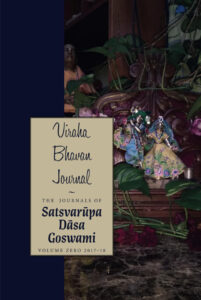
Viraha Bhavan Journal (2017–2018) was written by Satsvarūpa Mahārāja following a brief hiatus in writing activity, and was originally intended to be volume 1 in a series of published journals. However, following its completion and publication, Mahārāja again stopped writing books, subsequently focusing only on what became his current online journal, which began in August of 2018.

At first, I took it hard that I would have to live surrounded by the firemen, and without my own solitude. After all, for decades I had lived in my own house with my own books and my own friends. I was also now a crippled person who couldn’t walk, living among men who did active duties. But when Baladeva explained it to me, how it was not so bad living continually with other firemen and living in the firehouse with its limited facilities, I came to partially accept it and to accept the other men. I came to accept my new situation. I would live continually in the firehouse and mostly not go outside. I would not lead such a solitary life but associate with the other firemen.
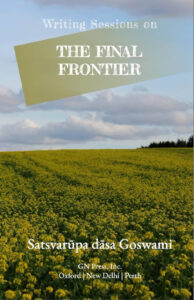
Let me write sweet prose.
Let me write not for my own benefit
but for the pleasure of Their Lordships.
Let me please Kṛṣṇa,
that’s my only wish.
May Kṛṣṇa be pleased with me,
that’s my only hope and desire.
May Kṛṣṇa give me His blessings:
Kṛṣṇa Kṛṣṇa Kṛṣṇa Kṛṣṇa Kṛṣṇa he
Rāma Rāghava Rāma Rāghava
Rāma Rāghava rakṣa mām.
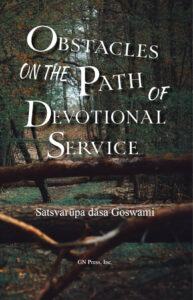
You mentioned that your pathway has become filled with stumbling blocks, but there are no stumbling blocks. I can kick out all those stumbling blocks immediately, provided you accept my guidance. With one stroke of my kick, I can kick out all stumbling blocks. —Letter by Śrīla Prabhupāda, December 9, 1972.
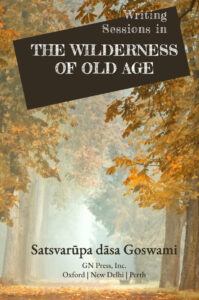
The Writing Sessions are my heart and soul. I’m trying my best to keep up with them. I am working with a few devotees, and they are far ahead of me. I wander in the wilderness of old age. I make my Writing Sessions as best I can. Every day I try to come up with a new subject. Today I am thinking of my parents. But I don’t think of them deeply. They are long gone from my life. Śrīla Prabhupāda wrote a poem when he was a sannyāsī, and he said now all my friends and relatives are gone. They are just a list of names now. I am like that too. I am a sannyāsī with a few friends. I love the books of Śrīla Prabhupāda. I try to keep up with them. I read as much as I can and then listen to his bhajanas.
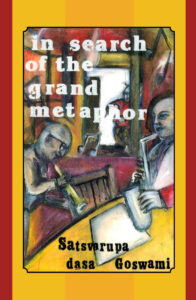
The metaphor is song. Explain it. Yes, particulars may not seem interesting or profound to readers who want structured books.
Wait a minute. Don’t pander to readers or concepts of Art. But Kṛṣṇa conscious criteria are important and must be followed. So, if your little splayed-out life-thoughts are all Kṛṣṇa conscious, then it’s no problem.
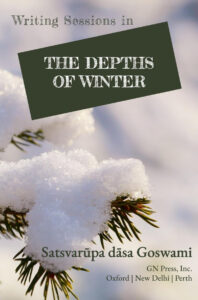
I am near the end of my days. But I do like the company of like-minded souls, especially those who are Kṛṣṇa conscious. Yes! I am prone to Kṛṣṇa consciousness. I have been a disciple of Bhaktivedanta Swami Prabhupāda for maybe almost sixty years. Sometimes I fail him. But I always bounce back and fall at his feet. It is a terrible thing that I sometimes do not have the highest love for him. It is a terrible thing. Actually, however, I never fall away from him. He always comes and catches me and brings me back to his loving arms.

This edition of Satsvarūpa dāsa Goswami’s 1996 timed book, Upstate: Room to Write, is published as part of a legacy project to restore Satsvarūpa Mahārāja’s writings to ‘in print’ status and make them globally available for current and future readers.
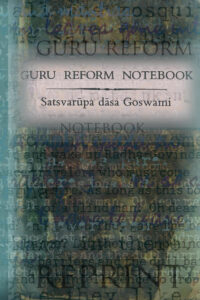
A factual record of the reform and change in ISKCON guru system of mid ’80s.

Readers will find, in the Appendix of this book, scans of a cover letter written by Satsvarūpa Mahārāja to the GN Press typist at the time, along with some of the original handwritten pages of June Bug. Together, these help to illustrate the process used by Mahārāja when writing his books during this period. These were timed books, in the sense that a distinct time period was allotted for the writing, during SDG’s travels as a visiting sannyāsī
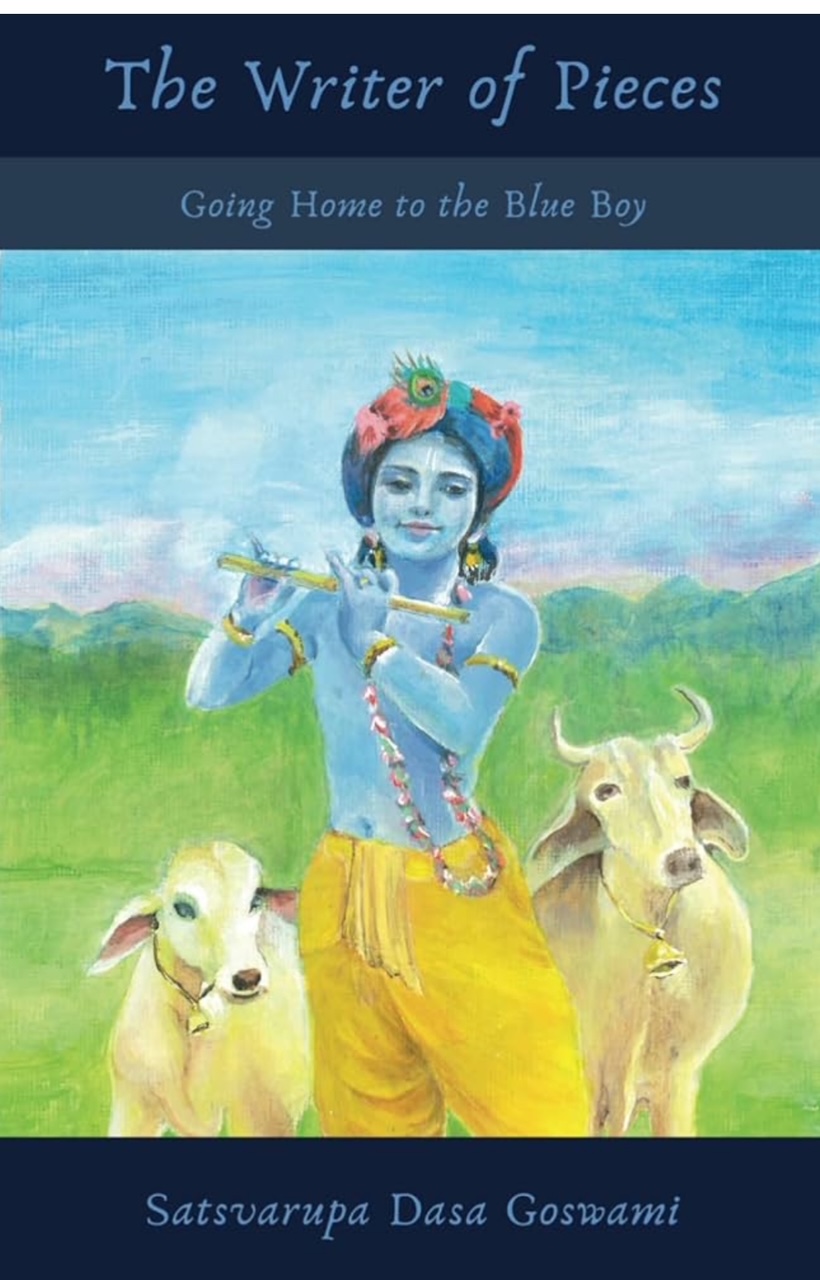
Don’t take my pieces away from me. I need them dearly. My pieces are my prayers to Kṛṣṇa. He wants me to have them, this is my way to love Him. Never take my pieces away.
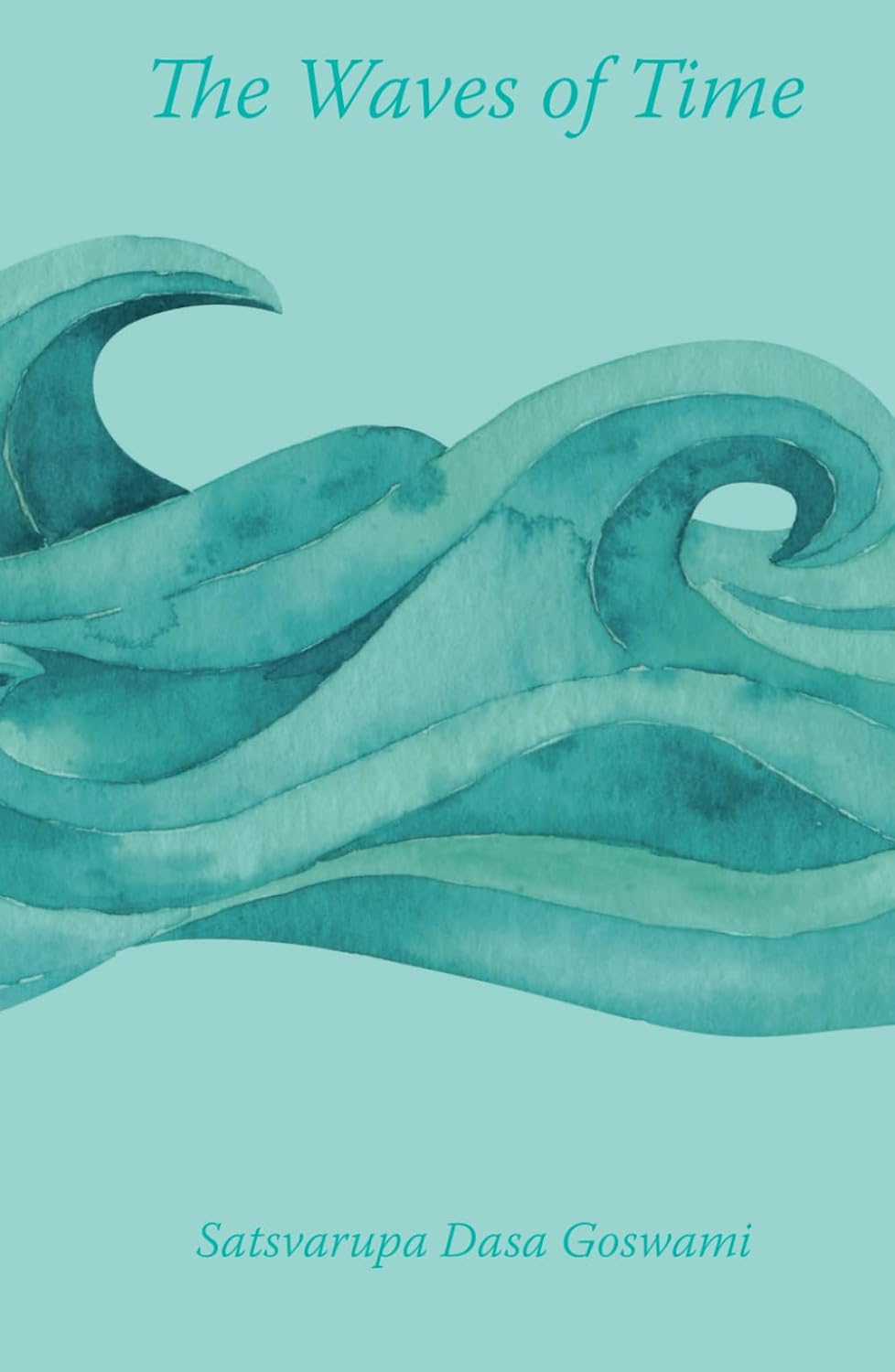
Many planks and sticks, unable to stay together, are carried away by the force of a river’s waves. Similarly, although we are intimately related with friends and family members, we are unable to stay together because of our varied past deeds and the waves of time.

To Śrīla Prabhupāda, who encouraged his devotees (including me) To write articles and books about Kṛṣṇa Consciousness.
I wrote him personally and asked if it was alright for his disciples to write books, Since he, our spiritual master, was already doing that. He wrote back and said that it was certainly alright For us to produce books.

I have a personal story to tell. It is a about a time (January–July 1974) I spent as a personal servant and secretary of my spiritual master, His Divine Grace A.C. Bhaktivedanta Swami Prabhupäda, founder-äcärya of the International Society for Krishna Consciousness. Although I have written extensively about Çréla Prabhupäda, I’ve hesitated to give this account, for fear it would expose me as a poor disciple. But now I’m going ahead, confident that the truth will purify both my readers and myself.

First published by The Gītā-nāgarī Press/GN Press in serialized form in the magazine Among Friends between 1996 and 2001, Best Use of a Bad Bargain is collected here for the first time in this new edition. This volume also contains essays written by Satsvarūpa dāsa Goswami for the occasional periodical, Hope This Meets You in Good Health, between 1994 and 2002, published by the ISKCON Health and Welfare Ministry.

This book has two purposes: to arouse our transcendental feelings of separation from a great personality, Śrīla Prabhupāda, and to encourage all sincere seekers of the Absolute Truth to go forward like an army under the banner of His Divine Grace A.C. Bhaktivedanta Swami Prabhupāda and the Kṛṣṇa consciousness movement.

A single volume collection of the Nimai novels.

Śrīla Prabhupāda was in the disciplic succession from the Brahmā-Mādhva-Gauḍīya sampradāya, the Vaiṣṇavas who advocate pure devotion to God and who understand Kṛṣṇa as the Supreme Personality of Godhead. He always described himself as simply a messenger who carried the paramparā teachings of his spiritual master and Lord Kṛṣṇa.

Dear Srila Prabhupada,
Please accept this or it’s worse than useless.
You have given me spiritual life
and so my time is yours.
You want me to be happy in Krishna consciousness
You want me to spread Krishna consciousness,

This collection of Satsvarūpa dāsa Goswami’s writings is comprised of essays that were originally published in Back to Godhead magazine between 1966 and 1978, and compiled in 1979 by Gita Nagari Press as the volume A Handbook for Kṛṣṇa Consciousness.

This second volume of Satsvarūpa dāsa Goswami’s Back to Godhead essays encompasses the last 11 years of his 20-year tenure as Editor-in-Chief of Back to Godhead magazine. The essays in this book consist mostly of SDG’s ‘Notes from the Editor’ column, which was typically featured towards the end of each issue starting in 1978 and running until Mahārāja retired from his duties as editor in 1989.

This collection of Satsvarupa dasa Goswami’s writings is comprised of essays that were originally published in Back to Godhead magazine between 1991 and 2002, picking up where Volume 2 leaves off. The volume is supplemented by essays about devotional service from issues of Satsvarupa dasa Goswami’s magazine, Among Friends, published in the 1990s.

“This is a different kind of book, written in my old age, observing Kṛṣṇa consciousness and assessing myself. I believe it fits under the category of ‘Literature in pursuance of the Vedic version.’ It is autobiography, from a Western-raised man, who has been transformed into a devotee of Kṛṣṇa by Śrīla Prabhupāda.”
 The Best I Could Do
The Best I Could DoI want to study this evolution of my art, my writing. I want to see what changed from the book In Search of the Grand Metaphor to the next book, The Last Days of the Year.
 a Hare Krishna Man
a Hare Krishna ManIt’s world enlightenment day
And devotees are giving out books
By milk of kindness, read one page
And your life can become perfect.
 Calling Out to Srila Prabhupada: Poems and Prayers
Calling Out to Srila Prabhupada: Poems and PrayersO Prabhupāda, whose purports are wonderfully clear, having been gathered from what was taught by the previous ācāryas and made all new; O Prabhupāda, who is always sober to expose the material illusion and blissful in knowledge of Kṛṣṇa, may we carefully read your Bhaktivedanta purports.

I use free-writing in my devotional service as part of my sādhana. It is a way for me to enter those realms of myself where only honesty matters; free-writing enables me to reach deeper levels of realization by my repeated attempt to “tell the truth quickly.” Free-writing takes me past polished prose. It takes me past literary effect. It takes me past the need to present something and allows me to just get down and say it. From the viewpoint of a writer, this dropping of all pretense is desirable.
 Geaglum Free Write
Geaglum Free WriteThis edition of Satsvarūpa dāsa Goswami’s 1996 timed book, Geaglum Free Write Diary, is published as part of a legacy project to restore Satsvarūpa Mahārāja’s writings to ‘in print’ status and make them globally available for current and future readers.